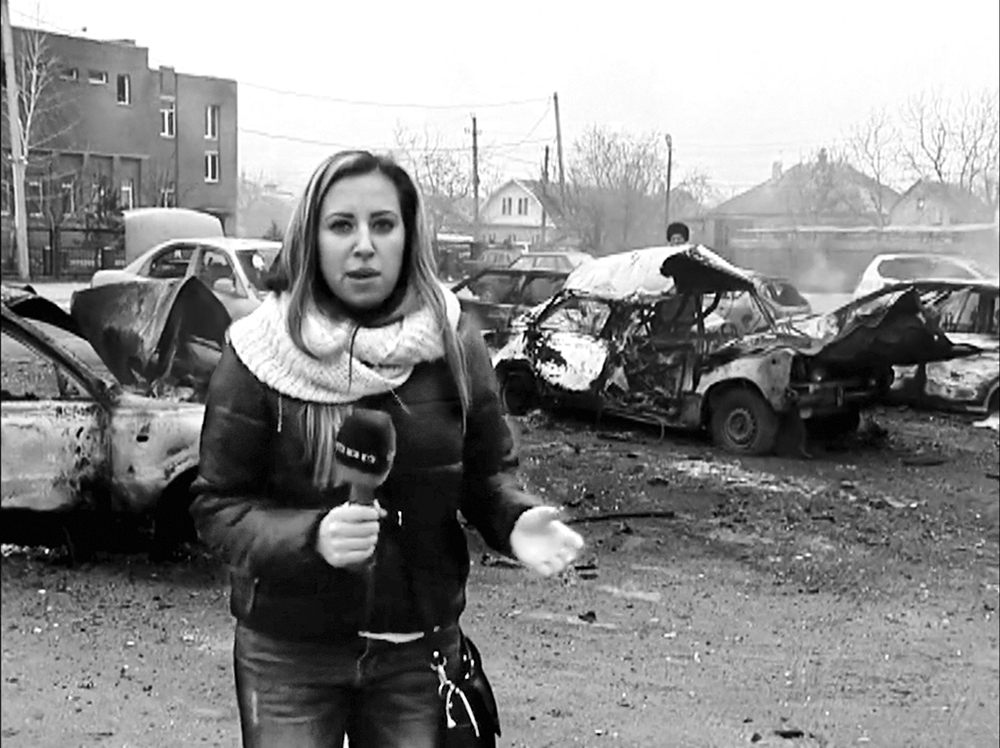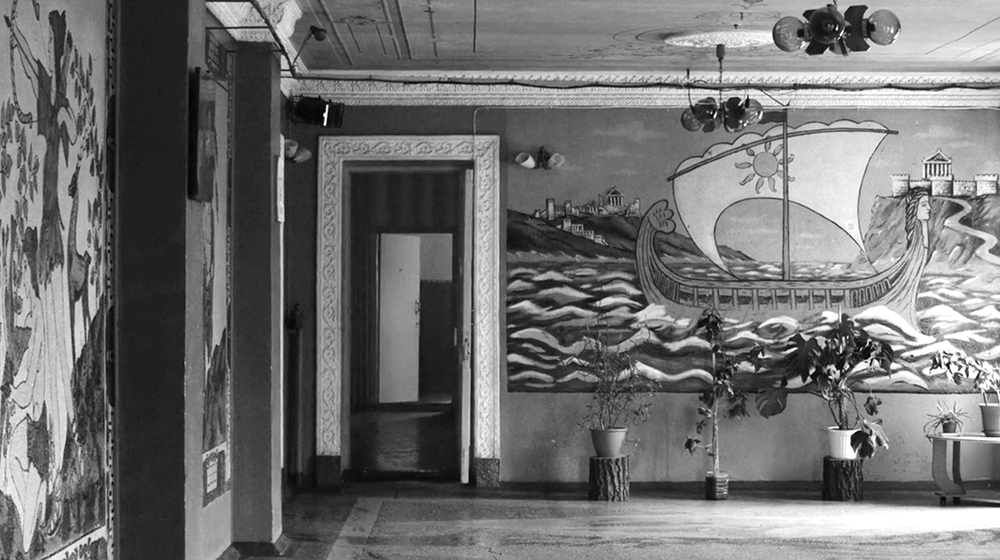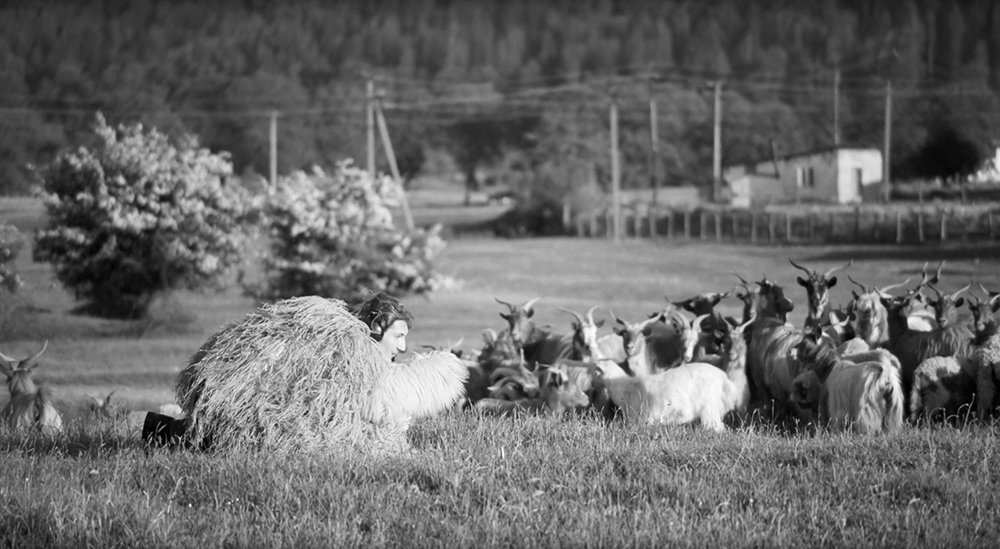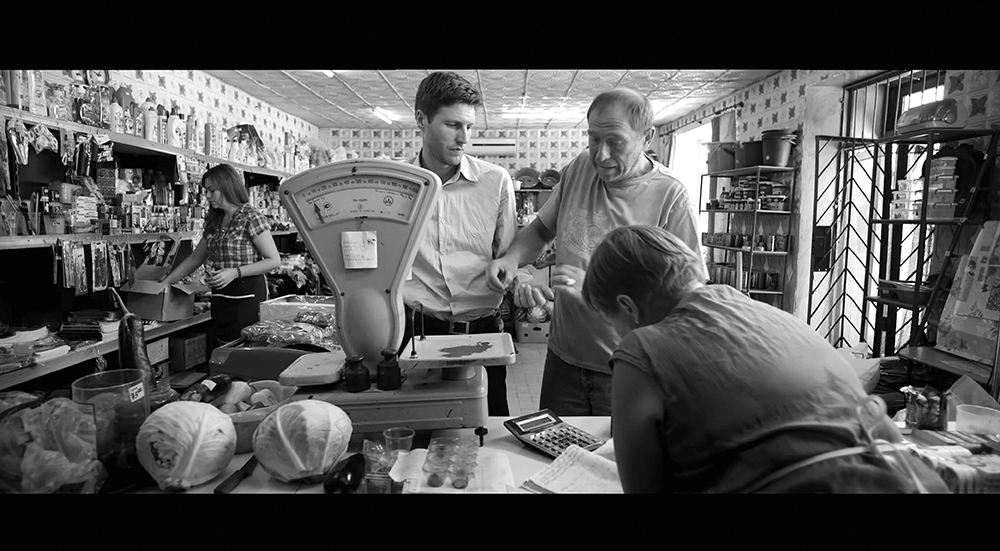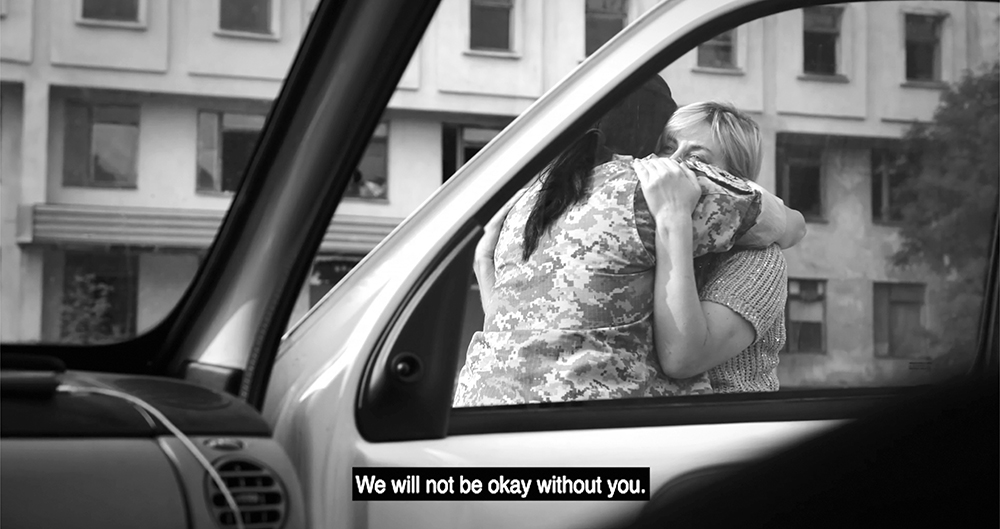Interview / Margo Dubovska, Mariia Arson, Rita Kulyk, Mark Chehodaiev / Version 6
Version: Can you tell us something about your group? Are you all students in Vienna and how and when did you come to Vienna?
Margo: In the beginning our group was only people from the University of Applied Arts Vienna, and mostly Ukrainians. In the meantime, some international people also participated, from Germany, Austria, and even Russia. This came through our work and organizational process. But in the beginning we all came from the University and that‘s where we got our first support to promote the project and actually make it happen. We are around ten now.
Version: What is your motivation to put together a film program for an Austrian audience? What do you want to achieve with the audience here?
Margo: I think one of our main goals was to show the destruction in a complex way, so that people don‘t just see some destroyed buildings, abstract people or numbers, which doesn‘t evoke anything. People are just horrified, but don‘t understand what it‘s actually about from a cultural and complex perspective. For me personally, it‘s the best way to go deeper into the culture because it shows a lot of perspectives and gets closer to the position of a Ukrainian experiencing the war. When you know the context, it‘s easier to feel empathy for what‘s happening.
Version: The war did not just begin in February, but has been going on since 2014. For us here, the events are only now really coming close and causing consternation and new perspectives on Ukraine. This is also due to the media coverage. Was that also a reason for you to start the project now?
Mariia: It was a big part of our motivation. We noticed that people here, before the full-scale invasion, didn‘t know that much [about] what was happening and they didn‘t keep track, which for me was a big surprise and a big disappointment. I‘ve lived here for three years and it always made me a bit angry because Ukraine is very near and what‘s happening now is also a result of the West just ignoring it for too long. So, it is very important for us to mediate the fact that the war has not just happened out of nowhere, that the escalation in February 2022 was not the beginning. Its development was a process that‘s been going for years and Ukrainian cinema has been working with this topic since it started in 2014. We want to show that it‘s a long process that‘s been impacting the life of Ukrainians for years.
Version: Who did the selection of the program in Vienna?
Rita: Mostly I did the selection. As a production designer I was familiar with the current situation in Ukrainian cinematography and had connections with directors and sometimes with rights holders.
Version: How is the situation in Ukraine for filmmakers? Before the war and currently? Are there any subsidies and educational institutions?
Rita: I would say that after February 24th, the variations of themes and their interpretation narrowed down to the most important theme, the Russian aggression and crimes against the Ukrainian people. That‘s why a lot of filmmakers, use their cameras and equipment to go to the hotspots and film these crimes, to have evidence. For instance, Alina Gorlova, who is the director of No Obvious Signs, makes documentaries about civilians who are faced with life in a war routine. Also, Maryna Stepanska, a famous Ukrainian director, shoots documentaries in Mykolaiv with a group of cinematographers. There are some production groups that make documentary series about different cities in Ukraine, from war zones. For example, Babylon‘13 permanently create and share short films on their YouTube channel so everyone can see them. But in general, the situation of the film industry is very sad because there is no state funding at all and it relies on international funding and help.
Version: The films you sent us are really kind of astonishing because they have such high quality and we ask ourselves, if there is a kind of tradition or school? The settings are striking, the individual scenarios seem almost like photographs, very arranged, similar to road movies.
Rita: In some films, this is a mixture of perception and sense of humor and talent. Before the 24th of February, there was a rise of Ukrainian cinematography. A lot of great movies appeared. I don‘t think that the National University of Cinema, as an educational institution, plays the main role in production. Professionals, autodidacts and authors, taste, and talent have a greater in influence.
Mark: I agree that some films in our program are similar on a certain level: the method, feelings, and sense of timing. But it‘s hard to define that as an impact of the universities in Kyiv. The National I. K. Karpenko-Kary Theatre, Cinema and Television University is Kyiv’s main film university and I know that most of our directors studied there or were connected with the people from there.
Version: Lukyan Galkin of Moviegram called Volcano „the most Ukrainian film in recent years.“ In his review he uses terms like “magical realism, social absurdity and powerful invisible dangers at every corner.” What do you think about this?
Mark: I think he is talking about a cultural code hidden in these films, which is difficult to read from the outside, for example for Western Europeans. And that‘s exactly the feeling I have when I see these films. In a way, they are totally Ukrainian because of their mentality. It‘s really hard to explain what tools or instruments make the film and how they could be implemented because that‘s really very sensitive and very, very thin ice.
Rita: The director of Volcano, Roman Bondarchuk, said in one of his interviews that this is a kind of reception of reality that one faces in Ukraine. He mentioned a kind of absurdity, with which one is confronted in daily life. One can take these perceptions very seriously. Or you have to face them with a kind of humor because it is too absurd to take seriously.
Mariia: This film also shows the irony of „peaceful missions“ of organizations like the OSCE. The West is very strong in rhetoric that holds up the protection of human rights at all costs, but when confronted with reality—much more complicated than this rhetoric—and actually has to do something, the West becomes quite helpless and unable to deal with the problems it claims it’s able to solve. Either there is a lack of qualified personnel or a lack of will to actually implement these human rights, or the system itself just doesn‘t work. This film ridicules some of that rhetoric and shows that the real world is much more absurd and much more complicated. The Western conventional value system is actually quite helpless in situations like this.
Margo: The „Ukrainian“ in this film, the absurdity, exists on so many layers and levels of contemporary Ukrainian culture because a lot of people are from the Soviet and post-Soviet eras, basically completely different backgrounds. Many things overlap and mix in such a way that at a certain point you feel like you are in an absurd film. It just depends on what level you feel it, but you definitely experience a variety of different meanings, approaches and views. Sometimes it’s hard to predict what‘s going to happen next, so you just watch how people’s realities coexist. It could be enough to go to the countryside to feel like you‘re in an absurd movie, for example. The city and the countryside are very far apart culturally. Everyday life is completely different and every day you experience something crazy, a kind of historical space opens up.
Version: We asked ourselves how history plays into Ukrainian society. After the collapse of the Soviet Union, many countries had great problems, in a dichotomy of foreign-determined security and the possibility of shaping new things in a self-determined way. We have heard that the Russian language is not popular in Ukraine at the moment, although many people speak Russian. How does this war affect Ukrainian society?
Mariia: It seems to me that this is Russian propaganda, which has its tentacles everywhere, including Western media. When you go through a traumatic experience, like Russia occupying your homeland, of course there are these strange psychological mechanisms that many of us go through, like I also switched to Ukrainian even though I always spoke Russian and my whole family spoke Russian. Of course, there are always radicals pursuing some political agenda, but they are not in the majority. People have been living in a bilingual country for so long and I don‘t see any processes that could lead to aggression against Russian speakers now. I still have many friends and family members who live in Kyiv and continue to speak Russian and, of course, support Ukraine and the Ukrainian resistance, and none of them are being humiliated for it now. I see this narrative of discrimination against Russian speakers only as a justification for Russian aggression. Russia as an imperialist country can’t imagine a society where people with two languages can live peacefully near each other.
Version: For us it is difficult to really understand how Ukrainian society works and what effect the war has on it because we are at the mercy of propaganda from all sides. For example, No Obvious Signs is about a woman who works in the military and can‘t stand the psychological strain. What effects have the war, and the propaganda, had on male and female role models or LGBTQ people?
Mariia: First of all, 22% of the people working or serving in the Ukrainian army are women, which is a large number in itself. And unlike men, they do it by their own choice. This is acknowledged and talked about in the official presentation of the government. There are sociological research projects, such as Invisible Battalion, that explore the issue of women in the army and in war. This research shows that the Ukrainian army is still very male-oriented and women do not feel completely free and equal there.
But I feel that the image of women is changing a lot during this war. Not only because of female soldiers, but also because of the women who are volunteering: women who are journalists, filmmakers, artists, doctors, etc. Women are no longer seen only as traditional guardians of the home and caring mothers and wives. I was also thinking about this in comparison to women‘s experiences in World War II because women were in charge of entire towns when the men were at war, or they served in the military, especially as medical personnel. Soviet women, especially, say in interviews that they were completely forgotten after [WWII] and the image of the male savior of the world came to the fore. This will not happen now because we live in a new era, in an era of information, where it is much more difficult for governments to conceal information because many people have access to it. So, I really hope that the experiences of women in war will not be forgotten after it ends. They will get attention because, of course, these experiences are different and also very important. Now it‘s just easier for us to talk about it.
Version: And vice versa, what does this situation with men do to the role of men?
Mariia: Historically, war has mainly been associated with men, at least in terms of representation. In Ukraine, however, there is a very, very strong feminist movement, albeit with numerous internal conflicts. Even though the image of men as typical war heroes is still very strong in Ukraine, Ukrainian feminism can achieve a lot. This image is deconstructed through many people, many artists and soldiers. I have many friends from the LGBTQ community who are also serving in the army and fighting for Ukraine. They’re going through all the problems one can face in a society where homophobia and sexism—which war reinforces—still exist, but it’s changing for sure.
Mark: The male part of the Ukrainian population is obliged to join the military. And at the moment, the male part between eighteen and sixty years old cannot leave the country. Women can cross the border freely. At the government level, there is a different perception of the role of women and men in this war. But I have not felt any pressure from any side since the invasion started in full—although I’ve been here in Europe and not gone back to Ukraine to defend my country or do what I should do legally. But I personally feel some pressure that comes from the perception of the role of men in society.
Version: The main character in My Thoughts Are Silent is practically the antithesis of this traditional image of masculinity. He is very tall, 215 cm, but delicate and seems very playful and sensitive. And I remember the subtle joke when the little soldier has to examine him and is forced to look up to him. That‘s really funny. There are a lot of ambiguous statements in this film. Can you tell us a little bit about the background of this film?
Rita: The film is based on the true story of Antonio Lukich’s friend who was supposed to record various sounds of Ukrainian fauna for a job. And he decided to go on this work trip with his father. Antonio realized that the relationship between a child and parent would be a strong core for the scenario. The composition of the film oscillates on the border between comedy and drama and there are two main strands: the scenes with the animals and the relationship between the main character and his mother. It was the debut feature film for me, Antonio, and [cinematographer] Illya Egorov, and our ideas far exceeded the budget, which made preproduction and production time very difficult. But that forced us to look for new ideas that would benefit the film. Now, Antonio Lukich has a second feature film, Luxembourg, Luxembourg, that will be screened at the 79th Venice International Film Festival in the Horizons competition program—again a drama/ comedy about twin brothers who meet their long-lost father in Luxembourg.
Mark: The main roles in the film were played by band members of Kurgan & Agregat, brothers Ramil and Amil Nasirov. This band, and their music, is also very special as a Ukrainian cultural code. I would also like to add that in the field of cinema and art in Ukraine it is very easy to meet and network with very well-known and talented people at eye level. The relationships between people are very horizontal in a way. The films we show have won some important awards, not only in Ukraine but also abroad.
Version: For My Thoughts Are Silent, the authors acquired the rights to the Spice Girls song Viva Forever. It must have been quite expensive, so why?
Rita: Antonio Lukic tried to recreate the image of his mother and Victoria Beckham is her favorite musician.
Version: In the film, the main character wants to emigrate to Canada. In Ukraine, while trying to record a special sound of a duck, he sinks in the swamp. Does this have some kind of symbolic meaning?
Rita: Many people had a desire to go somewhere, to live somewhere in the West and try to find a better life in Europe, America, or Canada. Of course, there were a lot of problems in society and corruption in the government. But this desire to look for a better life somewhere else has drastically changed after February 24th and a lot of people realized their responsibility to their country.
Mariia: As someone who left Ukraine myself, I would say that for me this was never motivated by an emotional connection to the West. I was always very emotionally and culturally connected to my country and never felt like I wanted to leave it. But sometimes you are just faced with the question of having the opportunity to work in your field and make a living from it or having access to an education that you don‘t have in Ukraine. Unfortunately, in the world, some countries have more problems than others. And leaving is not an easy decision and not an easy experience. There are many Ukrainians abroad, but I have a feeling that many of them have never forgotten their country and roots. Maybe the character of My Thoughts Are Silent expresses some harsh opinions like, „I will never come back.“ This is the main theme of the film. But these feelings are also motivated by some hopelessness because he needs new teeth and has no money for medical care.
Version: How do you judge the discussion, here in the West, about arms deliveries, pacifism, profiteers in the field of armaments or the energy industry, the role of the USA, etc.? What do you think about the interests of the different actors?
Rita: It‘s a great privilege to be a pacifist in terms of the war in Ukraine and sit somewhere in the West and have endless conversations and arguments about whether or not to send weapons to Ukraine, whether Ukrainians should resist or whether they should accept the genocide of their people and the destruction of Ukrainian cities. I think that it‘s impossible to win this war without weapons. To me this is obvious because Russia is not going to stop and Putin does not want negotiations with Ukraine. He wants their territory. He doesn‘t want Ukraine to exist at all and that‘s not just since 2014, that‘s based on our common history. Russia has an imperialist agenda there.
Mariia: I would also like to add that Investigate Europe1 published a report not too long ago showing that European Union countries have been selling and exporting arms to Russia for hundreds of millions of euros since 2014. I find it very strange that European, and especially German, intellectuals feel the need to write an open letter to Germany— when Ukrainian civilians are being destroyed in a genocide—and call on their country to be more pacifist, while for years—even after the embargo imposed on Russia after 2014—European countries were still exporting weapons to Russia. Ukraine is being destroyed with these weapons. So, I would like to ask these people: “Where were you? Where have you been for the last eight years? Why have you been so silent? Why didn‘t I hear your protests and why didn‘t I read your open letters to your country, which all this time has been selling weapons to kill Ukrainians? And now that we are trying to protect our homeland, why is this suddenly a problem?”
I have a feeling that these kinds of open letters and statements are just to exploit a hot topic, for people to profile themselves and say, “Ah, I have a very opposite position. I do not like the official representation. I‘m an intellectual with a different point of view.” I can‘t explain this hypocrisy in any other way.
The European Union has to stop pretending that it has nothing to do with Russia. There is this strange dichotomy with Russia and NATO. Russia and NATO countries, or Russia and European Union countries, are working together. Maybe they have a conflict at the level of diplomatic relations, but that doesn‘t change the fact that all along money has been flowing, and is still flowing, from the European Union to Russia.
So now it‘s only fair to help Ukraine solve the problem and win the war, which would not be so destructive if the West had reacted earlier and completely ended any relationship with this terrorist state. When people are being killed in a country and your friends and family are in constant danger of being murdered and you lose people that you love or know, you just want that to stop and the only option you have is to ask for protection and weapons. It‘s just not a matter of choice.
We can see what happened to the occupied territories. We can see what happened to Bucha. The Russians, I am sure, will kill anyone who is not to their liking. They want these territories just to keep their military bases there and use them as a parking lot for their tanks and for pure power and resources. And all the people who live there will be subjected to a very, very harsh wave of repression and atrocities. So, for me, there’s no question what we‘re fighting for.
No Obvious Signs (2018), dir. by Alina Gorlova
War Note (2020), dir. by Roman Liubyi
My Thoughts Are Silent (2019), dir. by Antonio Lukich / m.youtube.com/watch?v=-Wbar3jNIm8
Mariupolis (2016), dir. by Mantas Kvedaravičius / takflix.com/en/films/mariupolis
Volcano (2018), dir. by Roman Bondarchuk / takflix.com/en/films/volcano
1 Laure Brillaud, Ana Curic, Maria Maggiore, Leïla Miñano & Nico Schmidt, “EU-Mitgliedsstaaten haben auch nach dem Embargo von 2014 Waffen nach Russland exportiert,” Investigate Europe online, March 17, 2022, www.investigate-europe.eu/de/2022/eu-staaten-exportierten-waffen-nach-russland, accessed May 21, 2023.
